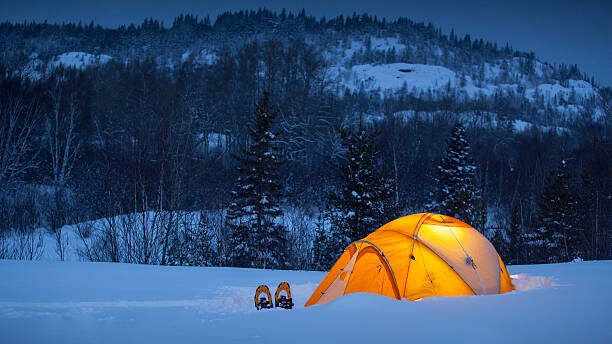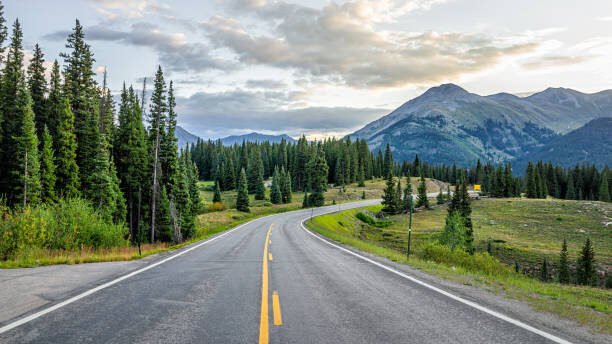Contents
- 1 Tips for Camping and Fishing Trip:
- 1.1 1- Benefits of Camping and Fishing:
- 1.2 2- Essential Gear for Camping and Fishing:
- 1.3 3- Choosing the Right Location:
- 1.4 4- Tips for a Successful Camping and Fishing Trip:
- 1.5 5- Recipes for Campfire Cooking:
- 1.6 6- Environmental Considerations:
- 1.7 7- Family-Friendly Camping and Fishing Activities:
- 1.8 8- Camping and Fishing as a Hobby:
- 2 Conclusion:
- 3 FAQs
Tips for Camping and Fishing Trip:
Camping and fishing are quintessential outdoor activities that allow individuals to immerse themselves in nature while enjoying recreational pursuits. Camping involves spending time outdoors, usually overnight, in tents, cabins, or recreational vehicles, while fishing entails the pursuit of aquatic species, whether for sport or sustenance.

1- Benefits of Camping and Fishing:
-
- Physical Health Benefits: Engaging in camping and fishing activities offers numerous physical health benefits. Fishing, on the other hand, requires physical exertion while casting, reeling, and maneuvering in various terrains, contributing to improved motor skills and coordination.
-
- Mental Health Benefits: The tranquil surroundings of nature during camping and fishing expeditions provide a therapeutic escape from the stresses of daily life. Immersion in natural environments has been shown to reduce stress levels, alleviate symptoms of anxiety and depression, and enhance overall mental well-being.
-
- Social Benefits: Camping and fishing foster opportunities for social interaction and bonding with family and friends. Shared experiences in the great outdoors promote camaraderie, communication, and the creation of lasting memories, strengthening interpersonal relationships and promoting a sense of community.
2- Essential Gear for Camping and Fishing:
-
- Camping Gear Checklist: To ensure a comfortable and enjoyable camping experience, essential gear includes tents, sleeping bags, camping stoves, cooking utensils, portable lighting, first aid kits, and appropriate clothing and footwear for varying weather conditions.
-
- Fishing Gear Checklist: Key fishing gear comprises fishing rods, reels, lines, hooks, bait, tackle boxes, fishing vests, polarized sunglasses, fishing nets, and appropriate fishing apparel such as waterproof clothing and waders.
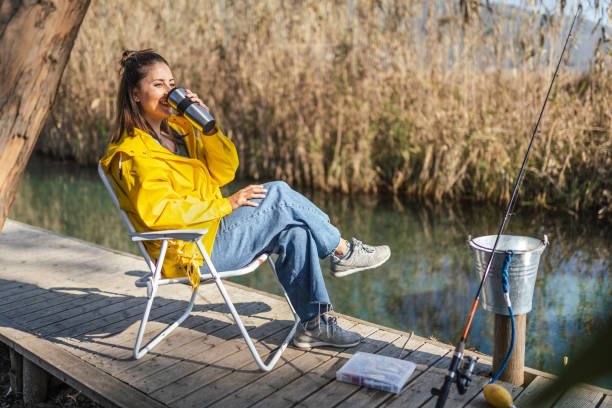
3- Choosing the Right Location:
-
- Factors to Consider: When selecting a camping and fishing location, factors to consider include proximity to water bodies, accessibility, terrain suitability, availability of amenities such as restroom facilities and potable water, local weather patterns, and regulations regarding camping and fishing activities.
-
- Popular Camping and Fishing Spots: Popular destinations for camping and fishing vary depending on geographical location and personal preferences. Examples include national parks, state forests, coastal beaches, lakeside campgrounds, and designated fishing piers or reservoirs renowned for their scenic beauty and abundant fish populations.
4- Tips for a Successful Camping and Fishing Trip:
-
- Preparing Your Campsite: Before embarking on a camping trip, it’s essential to plan and prepare your campsite adequately. This includes selecting a level and sheltered spot for pitching tents, organizing camping gear efficiently, securing food supplies from wildlife, and adhering to campground rules and regulations.
-
- Fishing Techniques and Tips: Successful fishing requires knowledge of various techniques such as bait selection, casting methods, lure presentation, and fish behavior. Researching local fish species, understanding their habitat preferences, and adapting fishing strategies accordingly can significantly improve catch rates and overall fishing enjoyment.
-
- Safety Precautions: Prioritizing safety is paramount during camping and fishing expeditions. Measures such as wearing appropriate safety gear, staying hydrated, avoiding risky activities, and being aware of potential hazards such as inclement weather, wildlife encounters, and water-related accidents can help mitigate risks and ensure a safe outdoor experience.
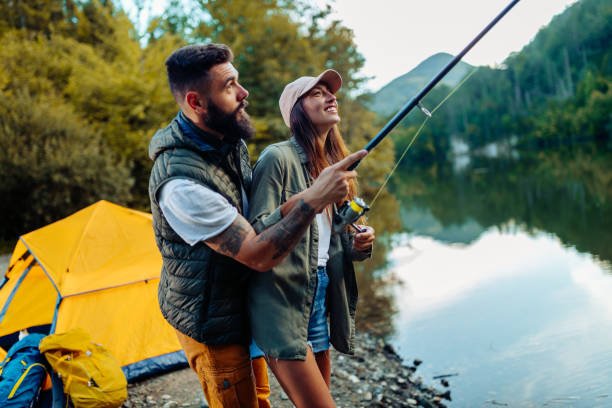
5- Recipes for Campfire Cooking:
-
- Simple and Delicious Meals: Campfire cooking offers a unique opportunity to savor flavorful and satisfying meals prepared amidst the serenity of nature. Simple yet delicious recipes include classics like s’mores, foil-wrapped potatoes, grilled sandwiches, and hearty one-pot meals such as chili, stew, and pasta dishes.
-
- Tips for Cooking Freshly Caught Fish: Cooking freshly caught fish over an open flame enhances its natural flavors and provides a rewarding culinary experience. Tips for cooking fish include cleaning and filleting fish properly, seasoning with herbs and spices, wrapping in foil or grilling directly over the fire, and monitoring cooking times to prevent overcooking.
6- Environmental Considerations:
-
- Leave No Trace Principles: Practicing Leave No Trace principles is essential to minimize environmental impact and preserve natural ecosystems. These principles include packing out trash, minimizing campfire impacts, respecting wildlife and vegetation, and staying on designated trails to prevent habitat destruction.
-
- Protecting Wildlife: Respecting wildlife and their habitats is crucial for maintaining ecological balance and biodiversity. This involves observing wildlife from a safe distance, avoiding feeding or disturbing animals, properly disposing of food waste to prevent wildlife attraction, and following regulations regarding protected species and habitats.

7- Family-Friendly Camping and Fishing Activities:
-
- Fun Games and Activities: Engaging in fun games and activities enhances the enjoyment of camping trips, especially for families with children. Activities such as nature scavenger hunts, storytelling around the campfire, stargazing, birdwatching, and outdoor sports like frisbee or soccer promote bonding and create cherished memories.
-
- Teaching Kids to Fish: Teaching children to fish instills a lifelong appreciation for nature and outdoor recreation. Simple fishing techniques tailored to children’s abilities, such as using bobbers or spin-casting reels, provide opportunities for hands-on learning, patience, and excitement as they reel in their first catch.
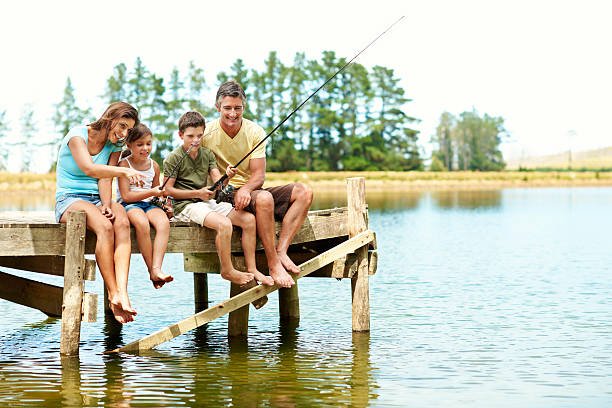
8- Camping and Fishing as a Hobby:
-
- Building Skills and Knowledge: Engaging in camping and fishing as hobbies offers opportunities for skill development and lifelong learning. Learning about outdoor survival skills, navigation techniques, fish identification, and environmental conservation fosters self-reliance, confidence, and a deeper connection to nature.
-
- Joining Clubs and Communities: Joining outdoor clubs, fishing organizations, and online communities provides avenues for connecting with fellow enthusiasts, sharing experiences, and accessing resources such as workshops, seminars, and guided trips. These communities offer support, camaraderie, and opportunities for collaboration in conservation efforts and advocacy for outdoor recreation.
Conclusion:
In conclusion, camping and fishing provide enriching experiences that promote physical health, mental well-being, social connections, and environmental stewardship. Whether seeking adventure in the wilderness, bonding with loved ones, or honing outdoor skills, the joys of camping and fishing await those who embrace the wonders of the natural world.
FAQs
Is camping and fishing suitable for beginners?
Absolutely! Both activities cater to beginners with accessible entry points and resources for learning basic skills.
What if I don’t have camping or fishing gear?
Many outdoor retailers offer gear rental services, allowing individuals to try out camping and fishing without investing in expensive equipment upfront.
Are there age restrictions for fishing?
Age restrictions for fishing vary by location and typically depend on local regulations. However, fishing is generally enjoyed by people of all ages, with many activities suitable for children and families.
How do I stay safe while camping and fishing?
Prioritize safety by familiarizing yourself with outdoor hazards, carrying essential safety gear, informing others of your plans, and adhering to safety guidelines and regulations.
Can I fish while camping in any location?
Fishing regulations vary depending on the area, so it’s essential to research and comply with local fishing laws and regulations to ensure a legal and enjoyable fishing experience during camping trips.

